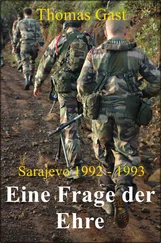The boy is the first to leave the house, carrying two bags and with his hockey helmet hanging down his back like a cowboy hat. He is followed by Zoran and Diana with the cases. She gives the keys back to the landlord.
“The flat is clean, we’re going, there are some things in the living room, so if you want anything, help yourself. You can throw the rest away.”
The neighbors watch her go in silence. The landlord gives her a limp handshake. Diana responds in kind.
At the bus station the bus that will take the Bosnian refugees from Sarajevo to Vienna Airport stands apart as if it is being hidden. The diplomats from the American embassy call out names and write them down. Relatives and friends stand to one side and cry. A blond young man with a strong foreign accent keeps on repeating in an official tone of voice that the ones who are traveling should not mix with those staying behind. Three young men laugh and wave to a young woman who replies with a walking stick. One of them shouts, “Don’t cry, people, America is a big country!” Everyone laughs and, pleased with the reaction, the young man repeats his announcement.
An old Muslim woman with a scarf gets out of a taxi. She is followed by a younger woman who takes the arm of a man with bandages over his eyes. He is wearing dark glasses, and his clumsy movements suggest that he has only recently become blind. Two huge characters come up to him and hug him and kiss him on both cheeks. A rumor circulates that the blind man was the military commander of the last Bosnian town to be massacred. The crowd of onlookers makes way for the blind man and his friend. They go straight past the Americans and join the group of people who are waiting to leave. The blind man is saying something. He laughs, shakes hands and gives the traditional two kisses.
After saying a few goodbyes, the sorrow merges with boredom. Those about to leave and the people seeing them off begin to exchange almost perfunctory smiles. A joker begins to sing. “To hell with America and all its gold too, / Why do I need your picture when I haven’t got you. .” There is no reaction, however.
At last the driver shows up, waving to the Americans, who begin to call out names. One by one the Bosnians climb on to the bus, sit down in their designated seats and glance back toward the farewell committee. People thought of the many things they’d forgotten to say to their relatives and friends. Each of them started mouthing words indecipherably through the window, or pulling faces and silently calling out to the others. When all the passengers had boarded the bus, the driver started up the engine. But then immediately he got out of the bus again and waddled over to the station as if he had no intention of driving anywhere.
Fifteen minutes later he came back, shook hands with each of the Americans and climbed back on to the bus. The hydraulics made a farting noise and the door closed. The passengers stopped miming or lip-reading in mid-sentence and the bus moved off. The people left in the bus station waved, and as the bus went past they all turned. The young woman turned to the blind man, who, like a mechanical doll, waved toward the invisible sound of the engine, a sound that stank of gasoline and old fishing boats.
The farewell party broke up in silence. An old man with a beret was the last person to speak. “Well, I’ll be damned if I understand this,” he exclaimed. “Mejra’s taken twenty-two kilos of things with her from Sarajevo, and now, once again, she’s allowed to take twenty-two kilos with her to America. But those twenty-two kilos were fifty this morning. If they make her leave America, she’ll have to divide things in two again. In the end she’ll be left with nothing, but even so it’ll weigh twenty-two kilos. That’s how it goes.”
Billie Holiday drank too much and lived in cigarette smoke for too long. That’s why she looked unhappy and gaunt. She sang as though she was sorrow itself, and that’s why people liked her. Later on, black and white girls appeared in her image. They were just as gaunt but their lungs didn’t belt out jazz in the same way. Nevertheless they readily absorbed the music. It consumed them the way they consumed alcohol. Sad and lonely, they’d end up in a doorway vomiting to the syncopated rhythm of the boogie-woogie. The only difference between Billie Holiday and her imitators was that her sorrow was authentic while theirs was inferred. The jazz singer created the things that were rejected by the girls’ bodies.
The Bell was a bar in a cellar dating back to Austro-Hungary. It was vaulted with lots of arches and laid out in the shape of the letter L. The sound of rusty trumpets blasted out from the middle of the room. It was the sort of jazz decreed by the architecture, and it was unlikely to be much improved by the use of loudspeakers or by the landlord’s attempts to enhance the acoustics by adjusting the treble or the bass. You always had the impression that two different types of music were being played simultaneously at opposite ends of the bar. At one end the customers stared emptily in front of them, inebriated by the sound or by the beer, and with heroin shadows in their eyes. At the other end people were laughing happily, out of range of the music and protected from any sensation.
The barman was called Sem. At least he used that nickname when he was drying glasses, pouring drinks and smiling benevolently at the customers. Otherwise it was Semezdin — but this name was too long and provoked more comments than was desirable in a place like The Bell. The landlord was called Vedran. He was dark, with a moustache and unshaven like a Mexican. He always had a different girl in tow. This is the life! was his motto, especially if you could spend it listening to music in The Bell. The rotten jazz mixed with beer and with the grass in your lungs and the sound of the muezzin became a way of avoiding reality, of floating over the streets of Sarajevo and the muddy yellow waters of the Miljacka. Vedran seduced his girlfriends by telling stories he didn’t believe. Not that he expected the women to believe them either. Each date ended with a big wet kiss, and heads would turn to watch the embrace, but none of his love affairs ever produced anything out of the ordinary. Of course Sem used to smile knowingly to himself, because Vedrans come and go but you can’t do without a barman.
Some time before dawn, when everybody had drunk too much and the barman was measuring the level in each bottle with scientific precision, a girl would be sitting at the bar, sipping an espresso. Her ruffled hair would be the only sign that she had been crying. The last guests would be putting their coats on, Vedran would have left already, and out of the corner of his eye Sem would be looking for someone to give him a lift home.
The girl crying would only prolong the illusion. But since a level of intolerance had already been reached, and by now everyone was thoroughly sick of jazz, the stragglers only despised her, if she didn’t actually annoy them. She was useful as a warning sign not to cross the borderline, reminding you that it would soon be time to go back to reality, to abandon the enchanted stupor and return to the mundane but also sustainable rhythm of ordinary life. To justify her tears would have been similar to becoming a druggy, an unhinged pleasure-seeker flying off to strange places where misguided people actually believe that an illusion can serve as a modus operandi in life. Billie Holiday is ok as long as she doesn’t become your only option.
That’s why you have to go home, into the fog and the snow, and back to your warm beds.
One day The Bell came face to face with reality. The guests packed their student bags and went back to their places of birth. They hoped that it would be easier to survive there. In Doboj, Teslić, Banja Luka, Mostar, Čapljina. . Vedran watched from his bedroom window the Cyclopean barrel of a sniper’s gun just staring back at him. He got scared, took his current girlfriend by the hand and escaped to a safer part of town. The records, tapes and record-player were destroyed in a fire. You see, jazz burns as easily as folk music, punk or anything by The Doors. He sat up home in an abandoned cellar, with just the one girl who shivered in his arms like a sparrow — or like Edith Piaf — while the shells fell everywhere.
Читать дальше










